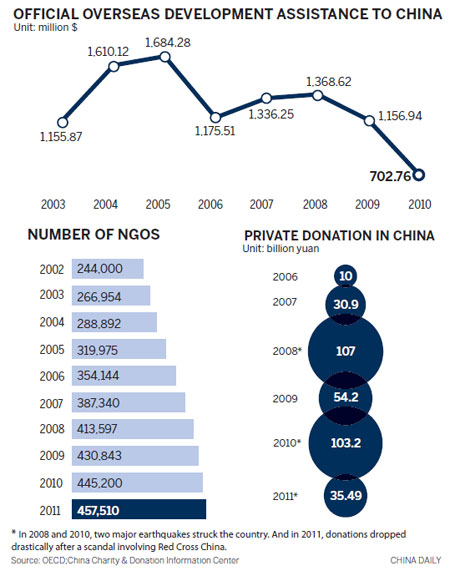Changing role
Updated: 2012-05-11 08:38
By Meng Jing (China Daily)
|
|||||||||
Technology transfer
Experts from the nonprofit sector feel that global NGOs in China will be more focused on technology transfer rather than financial assistance. Such a shift will not only shape a stronger civil society in China, but also create more Chinese organizations willing to be a part of sustainable development efforts across the world, they say.
Though China is still a developing nation, it no longer receives funding from many bilateral and multilateral agencies like the Global Fund to Fight AIDS, Tuberculosis and Malaria. In November, the fund froze payments for several of its projects in China, which till then was one of the biggest recipient nations.
Government aid from other richer nations like the UK and Australia, the other major source for international NGOs' China operations and Chinese grassroots NGOs, has also been steadily shrinking.
According to the latest statistics from the Organization for Economic Cooperation and Development, official development assistance to China from developed countries shrank from about $1.37 billion (1.04 billion euros) in 2008 to $702.76 million in 2010.
"Their own financial stagnation is one reason. The other reason is China's growing wealth. When I went to the US to raise funds in 2008, people were reluctant to donate to China because everyone there knew the country held an astonishing amount of US government debt," says Chen Taiyong, the China director of Heifer International, an Arkansas-based NGO. The NGO's connection with China dates back to 1946, when it donated 550 dairy cattle.
According to Chen, Heifer, which works largely on projects to end hunger and poverty by providing livestock and seeds to poor nations and communities, has decided to phase out the financial support to its China program by 2015, and make the nation a self-sufficient chapter by fundraising in Hong Kong.
The growing economic prowess, and the successful hosting of several big-ticket events like the Olympic Games in 2008 and the Shanghai Expo in 2010, have to some extent contributed to the changed global mindset, says Wang Ming, director of the NGO Research Center at Tsinghua University in Beijing, adding that it is no longer money that China needs the most.
China's private donations exceeded 10 billion yuan ($1.59 billion, 1.2 billion euros) for the first time in 2006, and jumped to 103.2 billion yuan in 2010, according to statistics from the Ministry of Civil Affairs.
Part of the reason why the coffers have not been strained is the growing number of rich people in China and the Chinese foundations.
"Rather than money, what China needs is the knowledge and skills that international NGOs have learned through decades of global practice, especially at a time when the government wants to play a more proactive role in global issues," Wang says.
Starting this year, China has released various positive signals in social development, including easing the registration regulations for social organizations, which is considered by many as a "breakthrough" in China. Several global experts like John Fitzgerald, the China representative of the Ford Foundation, have welcomed the initiative and expressed the hope that it will strengthen the social sector further.
|
Jim Gradoville, chief executive of WWF's Beijing office, says WWF sees growing interest in its technology from the Chinese side. Wang Jing / China Daily |


 Relief reaches isolated village
Relief reaches isolated village
 Rainfall poses new threats to quake-hit region
Rainfall poses new threats to quake-hit region
 Funerals begin for Boston bombing victims
Funerals begin for Boston bombing victims
 Quake takeaway from China's Air Force
Quake takeaway from China's Air Force
 Obama celebrates young inventors at science fair
Obama celebrates young inventors at science fair
 Earth Day marked around the world
Earth Day marked around the world
 Volunteer team helping students find sense of normalcy
Volunteer team helping students find sense of normalcy
 Ethnic groups quick to join rescue efforts
Ethnic groups quick to join rescue efforts
Most Viewed
Editor's Picks

|

|

|

|

|

|
Today's Top News
Chinese fleet drives out Japan's boats from Diaoyu
Health new priority for quake zone
Inspired by Guan, more Chinese pick up golf
Russia criticizes US reports on human rights
China, ROK criticize visits to shrine
Sino-US shared interests emphasized
China 'aims to share its dream with world'
Chinese president appoints 5 new ambassadors
US Weekly

|

|








